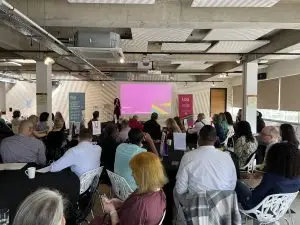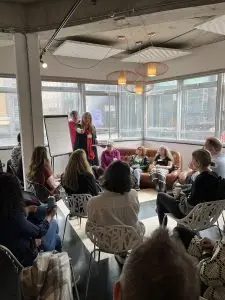Building partnerships to reduce digital exclusion
This year, LOTI and the Greater London Authority (GLA) held our annual Digital Inclusion Conference, which sought to bring together our now well established digital inclusion community. Once a year, we bring the community together to share and learn from each other as well as to also discuss important topics and think about the future.

We were delighted that our colleagues from boroughs, health and other public sector organisations, the private sector and most importantly the voluntary and community sector (VCS) were able to join us and contribute to the discussions. And in this blog, I share some of my reflections from the conference.
Commitment to building partnerships
Building Partnerships was the theme for this year’s conference. The main reason for this was to recognise that no one single organisation can solve this issue alone. Digital exclusion is a multifaceted issue and anyone of us can become partially or fully digitally excluded at any point in our lives.
This is particularly true in our society now where we’re expected to, sometimes almost exclusively, access both public and private services online. In some cases it can impact our ability to stay connected with our loved ones, to manage our finances and health, as well as to apply for benefits we’re entitled to. The list goes on.
Since starting our work in this space, back in 2021, we’ve organically grown our network of digital inclusion practitioners. The appetite of this community to not only come together to discuss important issues but also to collaborate in solving problems and sharing ideas is unmatched – certainly from my perspective. More recently, we’ve established this network more formally with a commitment to meeting every other month. Our first meeting was held in May, with the next one being in September, due to the summer period. You can find out more by getting in touch with us at contact@loti.london.

We’ve widened our reach over the years and are pleased to be working more closely with health colleagues both from primary and secondary care trusts, as well as Integrated Care Boards from across London. We’re starting to form tangible ideas for enabling Londoner’s engage with online health services and are looking forward to more cross-sector initiatives.
I can’t talk about partnerships and not include libraries and our dedicated VCSs who continue to deliver on the frontline – always adapting their approaches to suit the needs of the public. It’s thanks to their relentless efforts specifically and Good Things Foundation, we’ve been able to have the success we’ve had in reaching almost 60,000 people via Get Online London.
Is it possible to eliminate digital exclusion completely?
Over the years, I’ve come across different schools of thought on this which is great as we need different approaches to address digital exclusion. I was inspired to raise this topic at the conference, because of the many great points and experiences that colleagues shared in the panel and breakout sessions we’d organised.
In a session led by AgeUK London, we heard about how different groups, particularly the elderly, are being completely left out and unable to access services vital to them because of their inability to access online services for many different reasons. The case that was being made there was about councils, in particular, offering some kind of in-person provision.
As part of the panel session, someone raised that technology is moving at a fast pace and how important it is not only to improve access to digital services but also to upskill our workforce. This is particularly relevant to staff working in social care where increasingly they’re expected to recommend the use of assistive technologies and internet of things devices (sensors) to support the management of long term conditions or prevent things like falls, dehydration etc.
An additional element to consider is Artificial Intelligence (AI) in all its emerging forms. The task of convincing and upskilling the workforce to be able to use AI to improve productivity as well educating the public that decision making using AI is done ethically and responsibly is massive and something both public and private sector will need to heavily invest in.
We’re all familiar with the most obvious barriers (lack of connectivity, skills or even a device) to getting online, however digital exclusion can also arise simply because of poorly designed online journeys leading to poor or completely inaccessible experiences. One of the sessions considered this and discussed how we design services that are more than just digitised forms.
To eliminate digital exclusion we need to make sure that digital inclusion is considered at least as part of borough digital strategies or digital transformation programmes. With the help of the community, the LOTI team has created a digital inclusion strategy framework to help avoid each borough starting from scratch each time.
Looking to the future
The conference offered an opportunity to reflect on all that we’ve collectively achieved in this space as well as thinking about the future and how we make digital inclusion provision financially sustainable over the long term. This is something we’ll be considering over the next year and I imagine will be a feature of our future meet ups.
Genta Hajri



